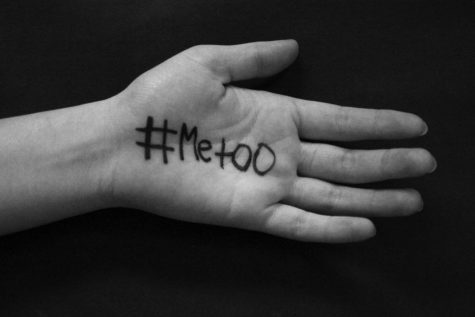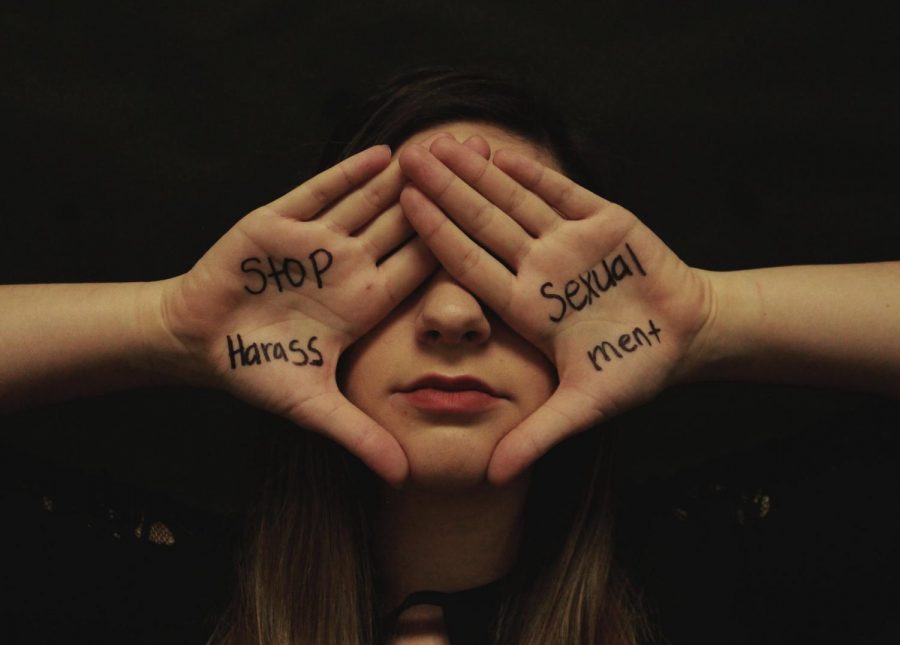No means no
Schools educate students about Sexual harassment/assault which affects students across nation.
Sexual harassment is an issue across the globe that needs to be addressed to schools worldwide.
February 22, 2019
Bodies fill the halls of the school as she walks to her next class. She notices a rowdy group of boys behind her snickering like schoolgirls. With a shove, one of the boys stumbles out of the group and right into the girls path. With a quick swipe of his hand he makes contact with her rear and runs back to his friends, laughing his head off.
When you think of sexual harassment what’s the first thing that comes to mind? Is it physical contact, or something as simple as whistling at a nice pair of legs. When asked what is one of the biggest problems at school, students unanimously said sexual harassment.
“It can vary from any scale,” Principal Traweek said. “From the verbal part of it, to the physical part.”
The National Education Agency (NEA) has researched this issue and gives this advice to public schools.
“When it happens in schools and isn’t addressed, students learn that sexual misconduct is acceptable, even normal. After all, boys will be boys, right? But beliefs and attitudes about healthy relationships and sexuality take root early on in a student’s life and schools must take the initiative to eliminate sexual harassment and assault first by acknowledging that these problems exist and then by tackling the problem in curriculum, policy, and the very fabric of school culture and community,” NEA.
Most high school students don’t understand that there is no difference between making a sexual joke or comment or making inappropriate physical contact.
Sexual harassment is the behavior characterized by the making of unwelcome and inappropriate sexual remarks or physical advances in a workplace or other professional or social situations. This happens in schools all around the country, and many movements such as the ‘me too’ movement have brought attention to this subject.
The ‘me too’ movement gives empowerment through community based actions led by survivors.
According to Chicago Tribune Staff and KT Hawbaker, “Tarana Burke coined the phrase “Me Too” as a way to help women who had survived sexual violence. The phrase has been reignited as the slogan of the anti-sexual harassment movement.”
We can educate students about sexual harassment by having them answer questions and teaching them what it means in society. Students throughout schools can participate in the ‘Me Too’ movement, all we have to do is stand up for the victims and ourselves by saying “Me Too”. This movement is a way for students to see the world through a bigger lense.
“The school can educate guys,” Junior Marco Rodriguez said. “By helping boys be aware of what they are doing to girls. Along with, letting girls know they can stand up against boys and say ‘me too’.”
Sexual harassment is more likely to emotionally affect girls rather than boys. Studies show 52 percent of girls are sexually harassed while this only happens to 35 percent of boys. This research shows that girls are more likely to become victims of sexual harassment rather than boys. Being a victim causing students to lose their sense of safety in their environment.
“I told my counselor,” Josanna Winters said. “I wanted to keep it away from the only place I felt safe, my home.”
In grades 9-12 sexual harassment comes to surprise to many, partly because it’s rarely reported. This is due to the fear of walking down the hall and receiving threats or being called inappropriate names. Although girls are more likely to talk to friends or family while boys like to bottle up their emotions. In some cases girls said that they felt they had been in this situation for a while. These negative emotional effects make problems for girls’ education in school.
“Not only do the survivors’ emotional and psychological scars endure long after the attack, their social lives, education, and career dreams are shattered. For some, the trauma is insurmountable; gender-based harassment and sexual assault have driven an increasing number of adolescent students to suicide,” Esther Warkov, founder of Stop Sexual Assault in Schools, said.
There are many ways you can prevent sexual harassment from happening to you. Create ways to separate yourself from the situation and know what makes you uncomfortable. Principal Traweek gives some advice.
“Have your own boundaries,” Traweek said. “When boundaries are crossed speak up and let them know.”
Back in the day, it was a completely different era. No smart phones, no apps, and no internet. There wasn’t an avenue to report sexual assault for women.
“In my day, we didn’t have anything like the ‘me too’ movement,” English teacher Vickie Amos said. “There were no sexual harassment laws. Us women had to deal with it ourselves.”
Now that it’s the 21st century, laws have been created to protect sexual harassment victims, but many women still have trouble coming forward. In schools, they have made laws that protect students and help them feel safe if they were to become victims.
“The Texas Education Code requires schools to prohibit and take steps to prevent student harassment,” ACLU of Texas said. “Many federal courts have found it unconstitutional if schools fail to enforce their anti-harassment policies equally on the behalf of students.”
When a report is made you have to be compassionate toward the victim so they know they are going to be okay. There are many ways for survivors to find support in the school and in the community. Schools have some type of system in place to accommodate the survivors. Victims can find a counselor or a teacher and speak to them about how to stop the harassment or assault.
“You want to have constant support for somebody who has been through this,” Traweek said. “Victims don’t just move past it, it impacts them mentally and they probably think about it everyday.”
It’s the schools job to act on the report and decide which direction is best to go. You really need to be a listener to see where the victims are mentally. It takes a lot of initiative to come in and even talk about it.
“It makes you feel like an object,” Winters said. “You feel small for awhile, but you have to realize you can learn from it and be a better person.”
*Names changed for the protection of identities.
Stand up against sexual assault
You can say ‘me too’
One of the first stories, that started it all, was told at an all-girl bonding session at a youth camp. A girl named Heaven had come up to a female youth worker, Tarana Burke, with heartbreaking news that would stick with her forever. Tarana sat there in silence listening as Heaven began to explain what her mother’s boyfriend had been doing to her body. Flashbacks began to arise for Tarana as Heaven explained her story. She couldn’t take listening anymore, and right in the middle of Heaven’s story, Tarana directed her to another female youth worker. As Tarana walked away, she couldn’t build up the courage to say ‘me too’.
The ‘me too’ movement was founded in 2006 to help survivors of sexual violence find pathways to healing. It has built a community of advocates who create solutions to stop sexual violence. Along with this, there has been a viral #metoo hashtag that has brought conversation to national dialogue. The goal is to expand global conversation around sexual violence and to speak to the needs of a broader spectrum of survivors.
According to metoomvmt.org, “the ‘me too’ movement affirms empowerment through empathy and community-based action.”
Taranna Burke started the phrase ‘me too’ in 2006. She herself is a sexual assault survivor and wanted to be helpful to women and girls who had survived sexual violence. The hashtag ‘me too’ inspired millions to post on facebook and twitter in response to sexual assault stories.
“I was just made aware of an earlier #MeToo movement,” Alyssa Milano tweeted. “The origin of the story is equal parts heartbreaking and inspiring.”
Many women who came forward as the hashtag hit the internet were white women whose stories started at their workplace. This hashtag was meant for the public to prove that sexual harassment or assault is an issue in many different settings. Whether it be at school, in a relationship, or anywhere on the street.
According to the Chicago Tribune, “Burke said that ‘me too’ has been a strategy long before it was a hashtag and will be there long after #metoo fades away.”
It will take more than a hashtag, however meaningful it has become, to do the real work that is needed now. Thankfully in this decade, we have many different organizations across the globe, whether it be online or in your community. Even with these organizations some women find it hard to come forward and talk about it individually.
“It’s also people’s lives. It’s a very touchy private, deeply personal thing,” Burke said.
Survivors should know that there are people out there that care and are willing to listen. If you feel like you’re drowning and can’t find the surface, look for someone you trust and let them know what happened.
Burke’s advice is “Don’t feel guilty about it, just know months from now if you’re ready to say ‘me too’, it’s there. It will exist forever.”

The me too movement has brought many testimonies forward from women across the nation. It has brought together an organization that helps women in different communities who have come forward about sexual assault.
But you love me, right?
Former virgin speaks out
about sexual harassment in relationships
It was only sex. He had convinced her that one time wouldn’t hurt anything. Josie Summers believed he loved her and wouldn’t push her to do anything she wasn’t comfortable with. But those weren’t his intentions. He wanted more than just the relationship. He wanted the “benefits” that came with having a girlfriend. Josie thought she could trust him. Afterall, he was her boyfriend.
You never really know who you can trust. Your best friends or even family members can deceive you. Sexual assault can start off with small signs of manipulation, emotional abuse, and bullying. It can change the way you feel and look at yourself, making you cope in ways that aren’t healthy.
“I didn’t deal with our ending relationship very well,” Josie said. “I turned to other boys, drinking, and smoking.”
Carter Mason was kind, shy and just about all around perfect in Josie’s eyes. Even with a long distance for the beginning two months of their relationship, Josie didn’t realize anything wrong with being with Carter until Josie found out that he had been going behind her back.
“Eventually, I found out he was talking to a bunch of girls,” Josie said.
Josie always thought they would end up spending the rest of their lives together, but the “rest of their lives together” ended sooner than she expected. As the months went on, their relationship germinated into something more toxic for both of them. More specifically, it was hurting Josie.
“The relationship was very emotionally abusive,” Josie said. “He lied to me and manipulated me into staying with him.”
November was when Josie’s virginity was taken from her. She remembers Carter had allegedly told her ‘it’s just one time’. In the moment she wasn’t thinking about it, she was just going along with what he wanted.
“After we had sex, I started to get emotional,” Josie said. “I was really starting to realize ‘oh that was my virginity’.”
Josie confronted Carter, but he turned the tables on her. Carter lied to Josie for five months saying he was a virgin and how she had taken that away from him. She felt like something was off and repeatedly asked if he was lying to her.
“He would get really mad at me for asking him,” Josie said. “He would say, ‘stop saying that I’m lying to you, believe me’.”
After Josie had found out Carter lied, they stopped any sexual contact for three months. Then one night, Carter violently flung Josie on the bed and started to take her clothes off. She repeatedly told him to get off her, but he didn’t listen.
“I told Carter if he did this to me, I would hate myself even more,” Josie said. “He told me he didn’t care.”
In August, their relationship finally ended. Josie kept everything that happened a secret for a very long time. After they broke up, she informed her mom that she and Carter had sex, but didn’t go into detail. Josie was still hesitant on talking about the relationship because Carter made sure she kept quiet. The end of their relationship took a mental toll on Josie.
“I was having bad dreams,” Josie said. “In the dreams, Carter was ‘doing things’ to me and telling me I was worthless.”
A few months after the break up, Josie started drinking and going out with boys. She also started to go to counseling thanks to her mom.
“Right now, I’m focused on healthy coping,” Josie said. “But I sometimes slip up.”
Many people don’t realize that even in a relationship if you’re forced to do something sexually that you aren’t ready for, it’s still assault. Josie never realized that what Carter was doing to her was wrong and is considered a violation of her body. Thankfully she finally decided to end the relationship and seek help.
“People need to be more aware,” Josie said. “Even if you love them, it can be rape. Just because you think they have good intentions doesn’t mean they do.”
*Names changed for the protection of identities. This student does NOT attend SHS.







